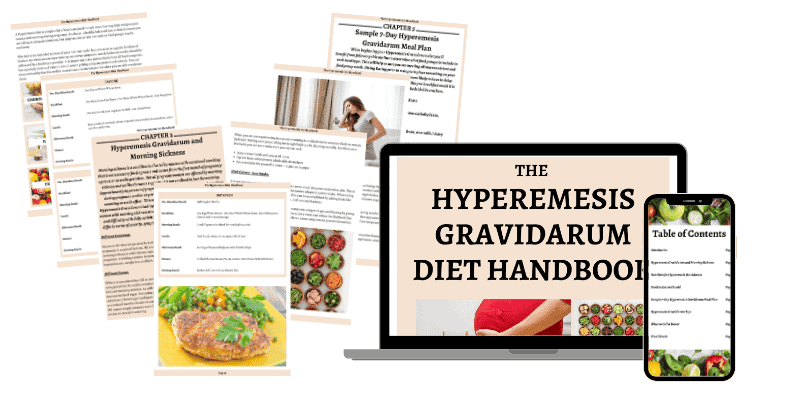If anyone tells me to eat another ginger biscuit on waking I am going to SCREAM!
When I say nothing can compare to the feeling of being sick morning noon and night I mean nothing. When the constant need to vomit overrides any other feeling in the world and throwing up actually gives you no relief at all.
Then you can be sure that you are in fact suffering from Hyperemesis Gravidarum (HG) an extreme case of what’s more commonly known as ‘Morning Sickness’
As someone who has struggled with HG with every one of my five pregnancies, when I found out I was pregnant with my fifth child the fear of having another Hyperemesis pregnancy and coping with four children was far more daunting then giving birth.
I would happily go through the pain of labor 10 times over if it meant that I wouldn’t have to suffer from Hyperemesis.
I think it’s important for moms to know how to differentiate between morning sickness and Hyperemesis Gravidarum.
It’s important you know the signs of when you become dehydrated and when you should go to the doctor.
By the time I got pregnant with my fifth child, I had put lots of strategies to help cope. These subtle changes made a massive difference in helping me cope with Hyperemesis with minimal disruption to my family.
Yes, there are lots of medical articles written by doctors to tell you to eat eight small meals a day, drink regular fluids, and eat ginger biscuits on waking. But what if even a sip of plain water makes you vomit?
The thought of food makes you retch? the smell of your husband’s aftershave makes you heave? They have NO IDEA what HG feels like, not a bloody clue
Princess Kate bought HG to the limelight when she suffered from it in 2014. This was welcome from the millions of women around the world who have been suffering but misunderstood as just having morning sickness.
Unfortunately for many of us, we don’t have the luxury of living in a palace with lots of support. Many of us have to continue to work or take care of other children we may have.
So here you have my advice from a mom of five who has suffered by this debilitating condition for each one of my pregnancies, I’ve been hospitalized, I’ve taken anti-sickness tablets so I know what you are going through……
Even writing this is bringing it all back and making me feel nauseous. That’s how bad it makes you feel…… The good news, I’ve given birth to 5 healthy babies weighing over 9lbs and none of them seems to have suffered from mama being sick 30 times a day!
WHEN DOES MORNING SICKNESS START
Morning sickness is a common first sign of pregnancy among some women. For many women, it is a welcome first sign of pregnancy.
Usually starting at the earliest at week six and peaking at week eight. It is commonly suggested that if you haven’t suffered by week 14 then you are unlikely to get it.
Surprisingly, for someone who suffers from HG I don’t normally get the sickness until week 7 and that’s when it goes from bad to worse.
My sickness peaks at week 10 when I am normally hospitalized for dehydration.

DOES Hyperemesis AFFECT THE BABY
One thing that used to really upset me, and trust me I’ve heard this more than once in each one of my pregnancies, is describing the baby ‘like a parasite and will take what it needs.’
I don’t know why but it gets me every time. I get what the professional is trying to say I just wish they could find some other analogy to describe my situation.
According to the American Pregnancy Association, Hyperemesis Gravidarum is a condition wherein a pregnant woman experiences extreme morning sickness, often characterized by the following symptoms:
• Vomiting
• Severe nausea
• Sudden weight loss, and; water-electrolyte imbalance
Around 70 – 80% of pregnant women experience morning sickness especially during the first trimester of their pregnancy.
There is also a number who experience extreme cases of nausea and vomiting which is called hHyperemesis Gravidarum.
To better understand the differences between the two, let’s talk about morning sickness first then compare them.
If you have been pregnant in the past, then I am sure that this term isn’t foreign to you anymore (unless you’re one of the lucky 20-30% who do not experience the condition).
Related: 18 of the Best Online Childbirth Classes Compared
What is Morning Sickness?
Aside from a missed period, one of the early signs of pregnancy can be nausea, which is sometimes accompanied by vomiting which usually around the first six weeks up until the end of the first trimester.
This is because of the normal hormonal changes in your body, but is nothing to to worry about.
Another thing about morning sickness is that you can alleviate the discomfort by doing some simple changes in your lifestyle like eating and drinking smaller amounts of food and liquids often all throughout the day instead of 3 large meals. Munching on plain soda crackers or saltines before getting out of bed in the morning or drinking ginger tea or lemonade also helps keep nausea at bay.

If you are pregnant and struggling with hyperemesis gravidarum, you are not alone. The Hyperemesis Gravidarum is handbook for you.
In collaboration with Trista Best MPH, RD, LDN and with the current up to date nutrition advice, this book includes, Nutrition for Hyperemesis Gravidarum, Foods to Eat and Avoid, Sample Hyperemesis Gravidarum Meal Plan, Hyperemesis Gravidarum Tips and much more.

What is the Difference Between HG and Morning Sickness?
There are a lot of differences between HG and morning sickness but here are the most common ones:
• With morning sickness, nausea may or may not be accompanied by vomiting while with Hyperemesis Gravidarum, nausea is accompanied by severe and uncontrollable vomiting.
• Nausea caused by morning sickness subsides around the 12th week of pregnancy while in HG, it can continue well after the first trimester.
• In morning sickness, the occasional vomiting caused by the nausea does not cause severe dehydration on the pregnant woman while HG causes serious and severe dehydration.
• With morning sickness, there is a big possibility that you can keep some of the food down even with vomiting while if you have HG, it’s next to impossible to keep anything down.
Other symptoms that you need to look out for in Hyperemesis Gravidarum include:
• Aversion to certain food
• Decreased urine volume/frequency
• Headaches
• Jaundice
• Low blood pressure
• Fainting
• Serious dehydration
• Loss of around 5% of pre-pregnancy weigh
• Confusion
• Skin becomes pale or dry
• Fast heartbeat
• Anxiety or Depression
Related: MILKOLOGY: The Most Affordable Online Breastfeeding Class

Hyperemesis Gravidarum Diagnosis
If your doctor suspects that you may be suffering from Hyperemesis Gravidarum, he may start with clinical evaluations which includes monitoring of your weight.
He may also check for ketones in your urine using a simple dipstick test, and you may undergo serum electrolytes and renal function tests as well as others, which your doctor might deem fit, to rule out other issues. Ultrasound will also be done to see if there are other underlying issues.
It is important that all these tests be performed to rule out other disorders that can also cause severe vomiting, like intestinal obstruction or appendicitis among many others, so that proper treatment can be applied.
It is imperative that you follow your doctor’s advice and go through these tests so that proper intervention and treatment can be started as soon as possible.
What Will Happen if You Have Hyperemesis Gravidarum?
Should you be diagnosed with Hyperemesis Gravidarum, your doctor will follow HG treatment protocol depending on the need and severity of your case. In some cases, hospital treatment or admission may be necessary to combat dehydration right away. Treatments can be any or all of the things listed below:
Hospital Treatments
IV fluids – depending on the severity of the condition, you will most likely be hooked up to intravenous fluids to help replenish your body with electrolytes, nutrients, vitamins, and to restore hydration.
Tube Feedings like Nasogastric or Percutaneous Endoscopic Gastronomy – In severe cases wherein the patient is really unable to keep her food down, tubal feedings may be done to restore nutrients and re-hydrate the body.
Medications – The doctor may also prescribe medicines to combat symptoms of Hyperemesis Gravidarum.
Alternative HG Natural treatments
Acupressure – some say that acupressure helps alleviate and reduce nausea in patients. To reduce nausea, you simply apply pressure at the middle tendon of your inner wrist, about three fingers away from the crease of your wrist. You can also use a sea band on this area if you prefer.
Bed Rest – Some pregnant women say that they are able to regain some comfort by getting bed rest. It is very important to remember though that too much bed rest can also be attributed for muscle and weight loss.
Herbs – A lot of women swear by ginger or peppermint tea in alleviating the discomfort and nausea. You can use either store bought teas or fresh and homemade ones. Please consult your doctor first to avoid medicine/drug interaction issues.
Exercise – some women who suffered from HG said that getting on their feet, doing simple exercises, or gentle yoga helped get rid of the nausea. Although generally fine, check with your doctor first if physical activity is allowed in your case.
Homeopathic and Hypnosis – Though some say that both have positive results in HG, it is very important that you consult your doctor prior to trying any of these or before taking any alternative medicines not prescribed by the doctor as they may have adverse or negative results on your pregnancy and your baby’s development.
Related: Amazon Baby Registry: All You Need To Know

Hyperemesis Gravidarum Support
You can always check with your doctor or the hospital if there is an existing support center for pregnancy-related health problems like Hyperemesis Gravidarum in place. Support groups can be a great resource for topics and ideas that people in your family (who do not know what HG is) may not be familiar with.
It is also good to be able to speak about your experience or even hear from other people who are going or have gone through the same thing, so you don’t feel utterly alone. Not everyone will understand what you are going through but if you can find a support group or counseling in your local area or even online, this can greatly help.
Can HG Cause Miscarriage?
One of the biggest concerns among pregnant women suffering from Hyperemesis Gravidarum is if it can cause miscarriage. Depending on factors like pre-existing medical conditions and overall health, there are several complications that may arise due to prolonged Hyperemesis Gravidarum especially if left untreated. It may lead to a ruptured esophagus, kidney failure, brain swelling, seizures, and even death.
HG Risks to the Baby
According to studies, infants from moms who suffered long term Hyperemesis Gravidarum are at a risk to allergies, growth problems, chronic constipation, gastroesophageal reflux disease, lactose intolerance, chronic respiratory infections among others.
HG and When to go to the Hospital
If you are worried that it’s HG and not morning sickness that you are suffering from, you need to be mindful of the following symptoms: frequent vomiting throughout the day, persistent nausea, weight loss, and can’t keep food down or liquids at all, you may be at risk so make sure to call your doctor or go to the hospital for proper advice and treatment.
HG and vitamin B6 – Does it help?
There are studies that suggest Vitamin B6 may help. Although there is a lack evidence that it stops or reduces the vomiting, vitamin B6 supplementation can help alleviate morning sickness or get rid of nausea so it’s still worth a try.
Typical dosage for vitamin B6 is 10-25mg, 3 times a day. Please take note that it is very important that you seek medical advice first prior to taking supplements and medications not prescribed to avoid pregnancy complications and drug interaction issues.
Just remember that although HG may be a serious pregnancy issue, there are treatments and medications available that can help you get through it. However, it is very important that you inform your doctor as soon as you notice you are unable to keep your food down and most especially if you notice weight loss.
The immediate health risk in HG is dehydration as this can be very critical for both you and the baby so it is best that intervention and treatment are started immediately.

If you are pregnant and struggling with hyperemesis gravidarum, you are not alone. The Hyperemesis Gravidarum is handbook for you.
In collaboration with Trista Best MPH, RD, LDN and with the current up to date nutrition advice, this book includes, Nutrition for Hyperemesis Gravidarum, Foods to Eat and Avoid, Sample Hyperemesis Gravidarum Meal Plan, Hyperemesis Gravidarum Tips and much more.

